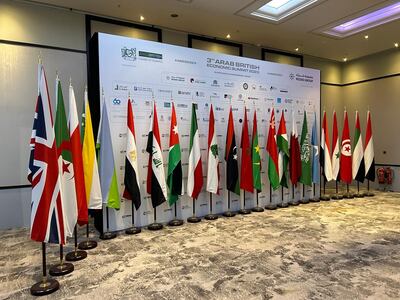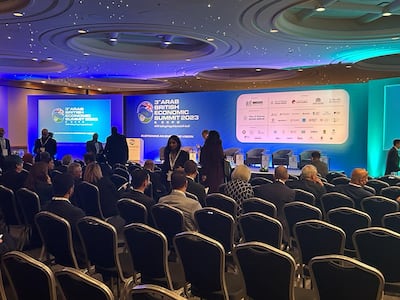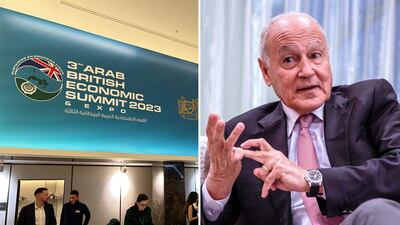Live updates: Follow the latest news on Israel-Gaza
Ahmed Aboul Gheit, Secretary General of the Arab League, issued a "wake up" call at a business summit in London on Monday as he called for an immediate ceasefire in Gaza to end an "evil war".
Mr Aboul Gheit told western diplomats and decision-makers gathered in central London that Arab countries condemned the "killing of civilians any time, anywhere" but said the “fully fledged crime” in Gaza could not be ignored as Israel’s actions would lead to further destabilisation in years to come.
“I tell all my friends and colleagues that I interact with in the western world: wake up,” he told the Arab-British Economic Summit. “Every day that passes without stopping this evil war increases the feelings of hatred and hostility. It moves us further away from the only possible solution to this conflict, which is a two state-solution."
He condemned the killing of Israeli civilians on October 7 and urged western leaders to do the same of Israel’s war in Gaza. “We [Arab states] have the courage to say that [...] we condemn the killing of those Israeli civilians,” he said.
"We expect everybody to take the same principled position."
Yet he accused western leaders of “double standards”, in which the lives of Palestinians are not valued as highly as others.
“We see that many of these values are applicable only in the western world and western concepts. The Arab world sees human values as values that prevail across the planet.”
Mr Aboul Gheit will be meeting UK Foreign Secretary David Cameron in London on Wednesday, as part of a delegation formed during the Islamic-Arab summit in Riyadh this month to meet the five permanent members of the UN Security Council.
“We hope the UK will help to reach an agreement to an immediate ceasefire through the UN Security Council," he told The National, referring to the UK's relations with Israel and historical involvement with Palestine through the Balfour Declaration.
He insisted Israel should not be enabled to displace Palestinians. "We need to stop Israel from doing any displacement ... by any means possible. If displacement happens, the problem will persist for a thousand years," he added.
The Israel-Gaza conflict was the central theme of several opening remarks at the third Arab-British Economic Summit in London, addressed by Mr Aboul Gheit on Monday.
Sameer Abdulla Nass, president at the Union of Arab Chambers, said: "Prosperity cannot exist without stability.
"It's about time that we, business people, British, Arab and everyone should speak up and influence their governments to create a stability.
"It's high time the conflicting parties sat down and find a permanent solution."

'Peace is not impossible'
Meanwhile, Lord Ahmad of Wimbledon, Minister of State for Mena at the UK's Foreign, Commonwealth and Development Office, said "peace is not impossible".
"It's a difficult pathway ahead, but we should never give up hope," he said.
"We should work everything we have, in whatever role – in business, in NGOs, in diplomacy, in politics – whoever we are, wherever we are, to try to deliver the vision of a lasting sustainable peace."
Aside from discussions about the Israeli-Gaza conflict, the summit also covered economic topics from food security to AI and FinTech, and the current negotiations towards a free-trade agreement (FTA) between the UK and the GCC states.
Britain's Trade Commissioner for Middle East and Pakistan, Oliver Christian, told the conference "it is more important than ever to support companies doing business in the Arab world and the UK". He said "excellent progress" was being made on the UK-GCC FTA.
There was much emphasis on the booming trade relationship between the Arab world and the UK. For example, trade between the UK and UAE was £25.5 billion ($31.1 billion) in the 12 months to the end of June, an increase of 47.3 per cent, or £8.2 billion, year-on-year.
This makes the UAE the UK's 19th largest trading partner and during the period accounted for 1.4 per cent of total trade with Britain.

'Dialogue matters'
As such, the summit aimed to build on already blossoming business relationships.
"The relationship between us and the UK and between the Arab world and the UK government is very special, and we believe that the partnership between businesses can really progress in a different way," said Mohamed Al Khadar, chief executive of Khalifa Economic Zones Abu Dhabi (Kezad).
Lord Ahmad said in his closing remarks: "There is much we can do together, collaboratively, collectively, working together towards common goals.
"After all, dialogue matters ultimately when we can deliver on conversations and discussions, and it is forums like this that help to make it happen."

